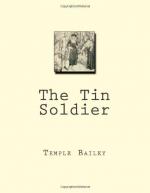“‘If you think,’ she said, ’that you suffer—what in God’s name will you think before the war is over? It hasn’t touched you. You won’t know what suffering means until your men begin to come home. You talk about hardships; not one of you has gone hungry yet—and the men over there may be cut off at any moment from food supplies, and they are always at the mercy of the camp cooks, who may or may not give them things that they can eat. And they lie out under the stars with their wounds, and if any of you has a finger ache, you go to bed with hot water bottles and are coddled and cared for. But our boys,—there isn’t anyone to coddle them—they have to stick it out. And we’ve got to stick it out—and not be sorry for ourselves. Oh, why should we be sorry for ourselves!’ The tears were streaming down her cheeks when she finished, and a gray-haired woman who had wept with the others got up and came over to her. ‘My dear,’ she said, ’I shall never pity myself again. My two sons are over there, and I’ve been thinking how much I have given. But they have given their young lives, their futures—their bodies, to be broken—’ And then standing right in the middle of the Toy Shop that mother prayed for her sons, and for the sons of other women, and for the husbands and lovers, and that the women might be brave.
“Oh, it was wonderful—as she stood there like a white-veiled prophetess, praying.
“Yet a year ago she would have died rather than pray in public. She is a conservative, aristocratic woman, the kind that doesn’t wear rings or try to be picturesque—and she has always kept her feelings to herself, and said her prayers to herself—or in church, but never in all her life has she been so fine as she was the other day praying in the Toy Shop.
“Yet in a way I am sorry for myself. Not for me as I am to-day, but for the Jean of Yesterday, who thought that patriotism was remembering Bunker Hill!
“Of course in a way it is that—for Bunker Hill and Lexington and Valley Forge are a part of us because our grandfathers were there, and what they felt and did is a part of our feeling and doing.
“I have always thought of those old days as a sort of picture—the embattled farmers in their shirt-sleeves and with their hair blowing, and the Midnight Ride, and the lantern in the old North Church—and the Spirit of ’76. And it was the same with the Civil War; there was always the vision of cavalry sweeping up and down slopes as they do in the movies, and of the bugles calling, and bands playing ’Marching through Georgia’ or ‘Dixie’ as the case might be—and flags flying—isn’t it glorious to think that the men in gray are singing to-day, ‘The Star Spangled Banner’ with the rest of us?
“But my thoughts never had anything to do with money, though I suppose people gave it then, as they are giving now. But you can’t paint pictures of men and women making out checks, and children putting thrift stamps in little books, so I suppose that in future the heroes and heroines of the emptied pocket-books will go down unsung—.




